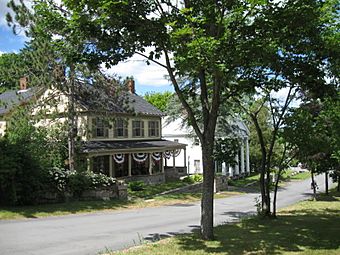Calais Residential Historic District facts for kids
Quick facts for kids |
|
|
Calais Residential Historic District
|
|
 |
|
| Location | Roughly, area along Main St. and Calais Ave., from Calais Ave. to Swan St., Calais, Maine |
|---|---|
| Area | 15 acres (6.1 ha) |
| Built | 1830 |
| Built by | Asher B. Bassford |
| Architectural style | Greek Revival, Italianate, Queen Anne |
| NRHP reference No. | 94001248 |
| Added to NRHP | October 28, 1994 |
The Calais Residential Historic District is a special area in Calais, Maine, filled with beautiful old houses from the 1800s. It's like a living museum where you can see how people lived and what their homes looked like long ago. This district includes about twenty historic homes along Calais Street and Main Street. It was officially recognized as a historic place in 1994, meaning it's important to protect these buildings for the future.
Contents
What is a Historic District?
A historic district is a group of buildings, structures, or other objects that are important because of their history or architecture. When an area becomes a historic district, it means these places are worth preserving. It helps people understand the past and protects unique buildings from being changed too much or torn down. The Calais Residential Historic District is a great example of this, showing off the town's rich past.
A Glimpse into Calais's Past
Calais, Maine, is a town located in a part of Maine called Down East. It sits right across the Saint Croix River from Saint Stephen, New Brunswick, in Canada. The 1800s were a very important time for Calais. It grew a lot because of its busy lumber industry. Trees were cut down, processed into wood, and then shipped out. Shipbuilding was also a big business in the first half of the century.
Main Street was the main road, running along the river. Calais Street grew as a place where people built their homes, stretching southwest from Main Street. Calais Street is special because it has a wide, grassy area in the middle. The first church in the area was built near where these two streets meet in 1826.
Exploring the Historic Homes
The Calais Residential Historic District covers three blocks on the south side of Main Street, east of Calais Street. It also includes two blocks on both sides of Calais Street. These streets are home to some of the oldest and most beautiful buildings in Calais.
The Oldest Houses
The oldest house in the district is the Holmes Cottage. It was built before 1831 and is a simple, charming cottage. For many years, doctors in Calais lived and worked here. Today, the local historical society owns it. Right next to it stands the Dr. Job Holmes House, built in 1850. This house is one of the best examples of the Italianate style in Calais.
Popular Architectural Styles
Many houses in the district show off popular architectural styles from the 1800s.
Greek Revival Style
The most common style you'll see is Greek Revival. This style was popular in America from about 1825 to 1860. It looks like ancient Greek temples, with features like tall columns, grand entrances, and simple, strong shapes. These homes often have a very formal and impressive look.
Italianate Style
The Italianate style was popular from the 1840s to the 1880s. These houses often have low-pitched roofs, wide eaves (the part of the roof that hangs over the walls), and decorative brackets under the eaves. They might also have tall, narrow windows and a square tower. The Dr. Job Holmes House is a great example of this style.
Queen Anne Style
Only a few houses in the district were built after 1880. These might show touches of the Queen Anne style, which was popular in the late 1800s. Queen Anne homes are known for being very decorative and colorful. They often have turrets (small towers), bay windows, patterned shingles, and porches with fancy woodwork.
Other Important Buildings
Besides homes, the district also includes two church buildings. The United Methodist Church, built in 1833, is the oldest religious building in all of Calais. There's also a small hotel from 1835. This hotel was the very first brick hotel built east of Bangor. It shows how important Calais was as a growing town.



